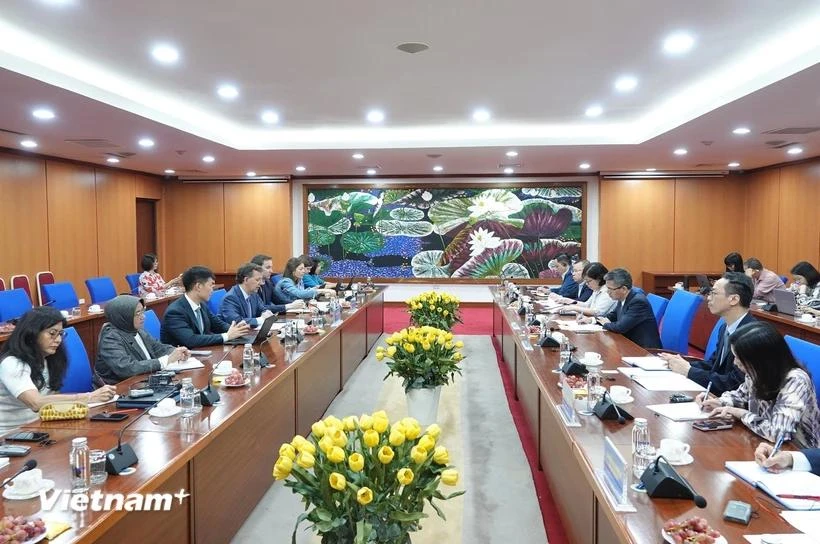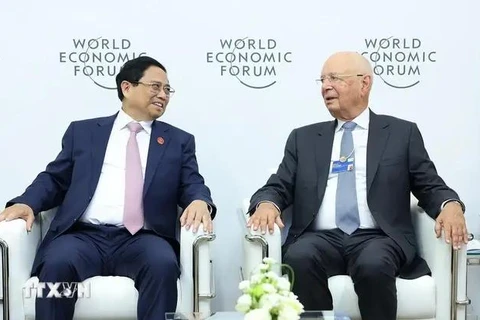
Hanoi (VNA) – Vietnam is recommended to continue to strengthen the fiscal framework, fiscal discipline, and upgrade the medium-term financial framework, according to the International Monetary Fund (IMF).
Speaking at the meeting with Deputy Minister of Finance Vo Thanh Hung on June 26, Paulo Medas, head of an IMF 2024 Article IV consultation team said that the consultation team highly appreciated the efforts and results that the Vietnamese Government in general and the Ministry of Finance in particular have made in perfecting and reforming public financial management policies and institutions to stabilise the macro-economy.
He said in 2024, Vietnam's fiscal policy is expected to continue supporting the country’s marco-economy but to a lesser extent.
IMF analysis results show that Vietnam's fiscal outlook is relatively stable and Vietnam's economic growth rate is relatively high compared to other emerging countries. Thereby, Vietnam's medium-term public debt is still under control.
Medas pointed out that recently, due to the impact of several shocks, the public debt levels of most countries in the Asia are relatively high with some seeing public debts double and more. However, Vietnam is one of the exceptions in maintaining a sustainable and relatively low debt level compared to some other countries in the region. He added that some of the difficulties and challenges that Vietnam is facing are quite common in Asia.

Medas also pointed out that tax revenue in Vietnam is very low compared to other countries in the world. It is a very important issue.
In addition, the aging population also increases pressure on the Government's public spending.
The IMF team recommended Vietnam continue to increase revenue mobilisation to reverse the trend of tax base erosion, create space to strengthen the social safety net, invest in infrastructure and solve climate change issues, promote its tax system reform strategy for the 2021-2030 period and improve the function of the capital market.
At the meeting, Deputy Minister Hung affirmed that fiscal policy has played an important role in supporting the economy, removing difficulties for people and businesses. Financial policies were loosened to increase resources for public investment, stimulate the economy and attract private investment resources.
Therefore, fiscal policies to support the economy will continue to be proposed, including extending the duration of the reduction of value added tax and the deadline for paying taxes and land rent, and reducing fees and charges.
Hung said that the Ministry of Finance has received technical support from the IMF in many important areas, which helped the ministry to improve its institutions and capacity in public debt management, treasury management, tax management, and tax policy.
The ministry highly appreciated the practical and effective Vietnam-IMF cooperation in general and the cooperation between the ministry with IMF in particular, according to the official.
He said the IMF team’s recommendations help the minitry perfect fiscal policy and public financial management methods.

In the coming time, Vietnam's economy will still face many difficulties and challenges in the context of the world economy’s uncertainties and an increasing pressure of domestic inflation.
To achieve the goals set by the Government and the National Assembly, it’s necessary to prioritise maintaining macroeconomic stability, controlling inflation, removing difficulties for production and business, and ensuring major balances of the economy, Hung said.
The IMF team, led by Paulo Medas, held the 2024 Article IV consultation with Vietnam from June 12-26. The team exchanged views with Prime Minister Pham Minh Chinh and senior officials of the State Bank of Vietnam (SBV), the Ministry of Finance, the Ministry of Planning and Investment, the Party Central Committee’s Economic Commission, the National Assembly, and other government agencies. It also met with representatives from the private sector, think tanks, and other stakeholders./.






















